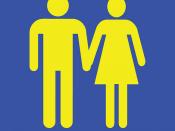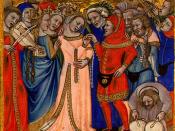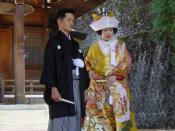In most romantic tales there is a hero and heroine, they vanquish the evil and usually settle into matrimonial ecstasy and live happily ever after, the end. After the tale is finished the book is put away and a nice snug sensation tickles the reader's heart. Wrong, the reaction that Elaine Hobby felt in Introduction to Women's Writings was that "Where romantic love appears in writing by women in this periodâ¦it is rarely noble or divine, and marriage does not of itself bring life's 'real satisfaction'" (71) so as you can see that the these classic tales where not giving the correct assumption of marriage instead they gave a story of what the men want to hear. And not only is it not happily ever after, for the women it's more like the end.
Marriage is a complicated subject, some love the thought of marriage and some despise the thought of marriage.
Even though some despise marriage, most still crave it for the belief that it will bring them a fairytale ending. But many feminine poets try to discourage this motion, Katherine Philips is one of those poets. Katherine Philips's text "A Married State" is an example of feministic writings trying to rid the world of the assumption that being married brings you life's 'real satisfaction'.
Katherine Philips starts her poem "A Married State" by explaining that being married is anything but easy. The wife is always busily trying to please the husband and if you see a wife's happy face she's faking it and hiding her hard luck, skillfully. The quote "This in wives' careful faces you may spell, Though they dissemble their misfortunes well."(2-3) is showing the last sentence and how the misconception that marriage generates a happily ever after started, the women fake it and make it...


